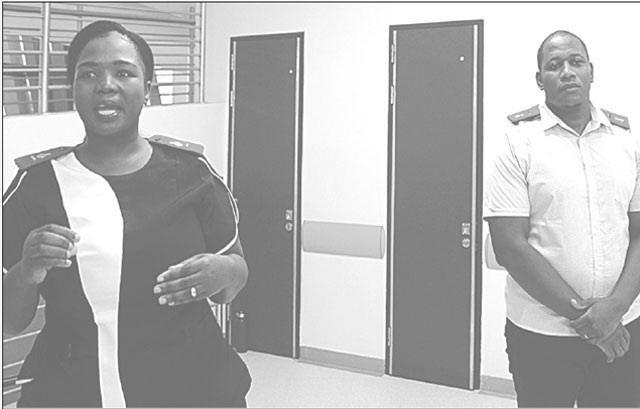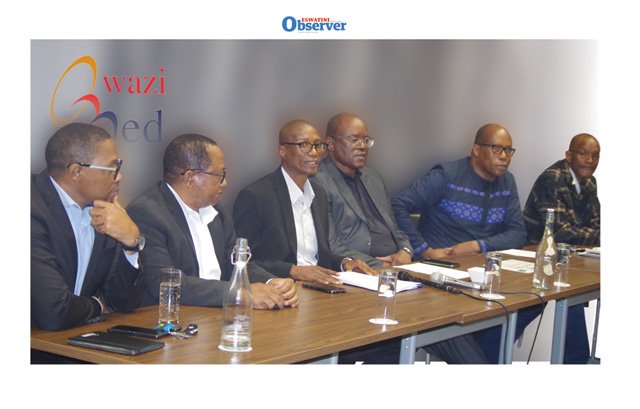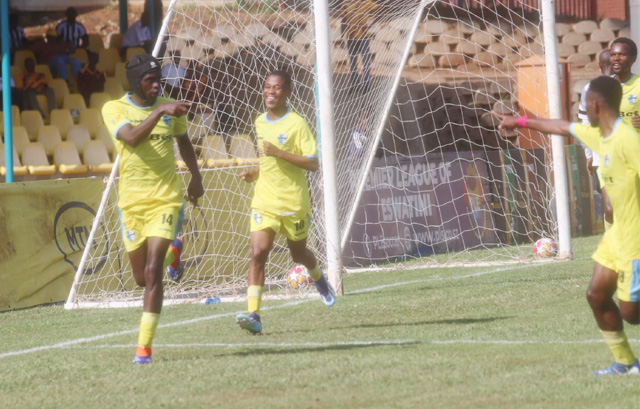By NOMFANELO MAZIYA | 2023-03-10

The lack of support to patients suffering from kidney disease is among factors that resulted in the death of close to 200 people in 12 months.
Patients with chronic kidney diseases face a number of challenges, among which is lack of transport money to attend sessions three times a week at most at the Mbabane Government Hospital and other health facilities.
Dialysis services are provided at the Mbabane Government, Hlatikulu Government and Raleigh Fitkin Memorial Hospitals.
Some of the patients travel from as Matsamo and Lomahasha, to name a few, according to the Chronic Kidney Disease Support Foundation Chief Executive Officer, Nkosinatsi Dlamini.
Chronic kidney disease is when the kidney function gets worse. High blood pressure and diabetes are two common causes of chronic kidney dieseas. Dlamini, who was speaking at the Mbabane Government Hospital in honour of the World Kidney Day, which is commemorated on March 9 annually, said most of those affected found themselves jobless as they spent time at the renal unit.
energetic
He said these were people who were young and energetic but were faced with financial challenges.
As a result of the challenges, he said most dialysis patients slept in compromised places in the hospitals, hence that led to them getting infected with other conditions that would otherwise have been easily avoided.
“This causes severe stress to the patients as some do not have support of their close family and acquaintances as they do not understand the complications that come with this condition,” he said.
Dlamini said currently 298 people have kidney disease and were on haemodialysis.
He said 34 were on peritoneal-dialysis, which is home dialysis.
“Forty-eight are dialysing at Hlatikulu Government Hospital, 44 are at Raleigh Fitkin Memorial Hospital in Manzini and 206 are dialysing at the Mbabane Government Hospital. Inside 12 months close to 200 kidney patients have died due to multiple factors,” said Dlamini.
He further stated that it was of great importance to lessen the burden that was carried by people who undergo dialysis in the country saying “every Liswati needs to know about kidney disease, but especially if you have one of the risk factors – diabetes, HIV, hypertension, heart disease, obesity or a family history of kidney disease.”
He stressed that knowing you are at risk was the first step towards living a healthier life and the Foundation worked hard in soliciting funds to get experts to help in prolonging lives of kidney patients and to bring awareness on how people should live their social lives, which had a direct impact on the function of the kidney.
One of the patients on dialysis, Nontsikelelo Magagula, a 29-year-old with an energetic spirit, said she transferred to Mbabane Government Hospital because it was closer to home in Pigg’s Peak.
Magagula highlighted some of the challenges they face as they undergo treatment.
“When I arrived at the hospital, I found that patients would sleep in the passage on cardboard boxes and although I am not sure who, but someone then donated mattresses, which we now sleep on,” said Magagula.
She shared that she had been on dialysis since March 2019 and her journey began at the Hlatikulu Government Hospital after she had been referred by her local clinic.
“I receive treatment three days a week. I cannot go home and return the following day because transportation is costly, especially because I would have to travel to and from Pigg’s Peak. As a result every day after the treatment I sleep in the passage and go back home on Fridays,” she said.
Stated
Magagula further stated that in the midst of it all, while sleeping in the passage she incurred food expenses because the hospital did not cater for them since they were not admitted.
“We suffer a lot when receiving treatment because we become prone to infections. Our immune systems are already weak and the passage is not hygienic as dustbins from the lab go through there,” she said.
She raised serious concern around the sanitation issue stating that hospital bedding was washed every day and the blankets they used were not in the best physical and germ-free state.
“It would be helpful to have a ward to sleep in while we wait for treatment,” she said, adding that due to the chronic disease she had not worked a day in her life.
Patient on dialysis warns against imbita
A patient, who has been undergoing dialysis since 2013 at the Mbabane Government Hospital, has warned against the use of traditional medicines.
Sipho Fakudze warned those living with kidney disease to refrain from using herbal treatments once they started dialysis.
Fakudze said he advised that these did not work. He said he was commemorating 10 years on dialysis this year.
“A number of people who I have been coming here with have died over the past 10 years. A number of them relied on herbal treatments, however, I have never seen or heard of a single patient who left dialysis because he had been healed by these herbal treatments,” said Fakudze. He further urged the public to offer the much needed support to their friends and family who were undergoing dialysis because it was a serious issue and very taxing physically, emotionally and otherwise.
Changes
“Many changes need to be made in one’s life such as your diet and lifestyle, therefore, family support is very important. Once a patient is on dialysis, they require a lot of support, especially in making those lifestyle changes,” said Fakudze.
He said some of the lifestyle changes include refraining from alcohol consumption and that anything more than an English cup of water would have a negative effect on a kidney disease patient.
Employers must be supportive, understanding
Employed by the attorney general’s chamber, Chronic Kidney Disease Support Foundation Chairperson, Ntobeko Mamba, said he had an understanding and supportive employer.
Mamba said he was fortunate to have been hired by the attorney general’s office.
“When I was hired I could still walk but with time, some of the complications that come from dialysis weaken the bones which affected my ability to walk but my employer has been understanding and is supportive,” he said.
He said dialysis was a physically taxing treatment that took about eight hours a day, which meant that people could not necessarily receive the treatment and then return to work to perform their duties. “As we speak, I have been on and off work for the past two years, however, my employer has been lenient and understanding of my situation, therefore I have been blessed to still have a job,” he added.
Mamba said the situation was very difficult as people lost their jobs because companies did not understand an employee who would be absent from work three days a week for treatment. Adding, he stated that this was also because upon their return to work, the employees would be weak and unable to execute some of the duties they were previously able to.
“What I can ask for is for companies to be patient with employees. In the case that an employee cannot execute their duties as before, please redirect the flow and see where else they can be placed rather than to dismiss them from work because that is as good as taking their lives, that contributes largely to stress and patients end up passing away,” said Mamba.
He said many members of the foundation had lost their jobs and their means for livelihood because they were constantly sick or in and out of hospital, which led him to plead with employers to work hand-in- hand and support their employees .
share story
Post Your Comments Below

THE recent turn of events at SwaziMed has underscored deep-rooted governance challenges that thre...
Health officials have reported a significant decrease in new HIV infections among men, in...
Social media users have reacted with shock and sorrow to the death of former Mhlume Unite...

Sisonkhe FC ……........….. (0)2
Mpendulo 55th, Thab...
All material © Swazi Observer. Material may not be published or reproduced in any form without prior written permission.
Design by Real Image Internet